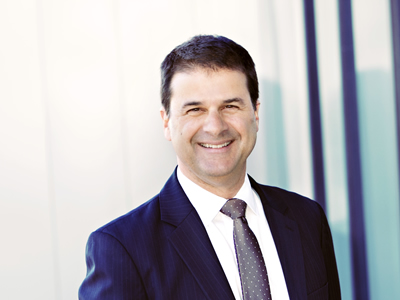This story originally appeared in Lawyer, Fall 2015.
 Daryl Campbell '11 isn't just the president and CEO of Seattle Goodwill. He's also a shopper.
Daryl Campbell '11 isn't just the president and CEO of Seattle Goodwill. He's also a shopper.
"I love going into the stores," he said. "You always find some kind of treasure."
In fact, Shoreline's Goodwill recently saved the day for Campbell when he was visiting there for business. At lunch, an ugly blob of balsamic vinaigrette splashed onto his pastel button-down business shirt. "I can't go into meetings like this," he thought, so he ducked into the retail store and scoured the racks for a replacement.
"I found the perfect shirt, nice and clean," he said. "I bought it and went to the back right away to change. It was four dollars! And I didn't even use my employee discount."
Strolling through the high-tech classrooms at Goodwill's Seattle headquarters, a stunning LEED Gold certified building in the Rainier neighborhood, Campbell said he found the perfect job when he landed at Goodwill in August 2014. That's because it's about more than secondhand treasures and poppin' tags.
"Our mission here is nothing less than ending poverty and restoring the middle class," he said. How? By helping people get jobs.
Seattle Goodwill, one of 165 affiliates of Goodwill Industries International, operates 25 retail stores and employs over 2,000 people across five counties. The Seattle flagship store is the largest Goodwill retail store in the country and a nearby Goodwill outlet was one of several locations featured in the video for hip hop artist Macklemore's 2012 hit song, "Thrift Shop."
Revenue from the stores goes toward free programs and services at the organization's 10 job training and education centers. Popular classes include computer skills, English for speakers of other languages, cashiering, and GED prep.
In the 2013-14 fiscal year, Goodwill helped more than 9,200 people, many of whom were low-income single parents, immigrants, people of color, former offenders, or those struggling to get by without a high school diploma or GED.
Though he doesn't work in a traditional legal field, Campbell said his Seattle University law degree has been invaluable in his leadership positions, both as CEO of Seattle Goodwill and as president of Shoreline Community College, a position he held from June 2013 to August 2014.
"My experience at SU was tremendous," he said. "What law school helped me understand was how to parse a problem, how to peel back all the layers and look at them from different perspectives. It's a real challenge to take a step back and consider that there are multiple perspectives, but being able to do that has made me a much better leader."
Campbell, a New York native, enjoyed a diverse career before enrolling in Seattle University School of Law's part-time program at the age of 47. He played piano professionally. He worked as a registered dietitian. He managed finances and operations for an $8 million health club company, experience that eventually led him to become chief financial officer for Goddard College in Plainfield, Vermont. He found his niche in higher education and moved to the Northwest to become Shoreline's vice president for administrative services, a job he held while attending law school.
Though he passed the bar and established a solo family law practice after graduation, Campbell said law school was more about setting a goal and daring himself to meet it. "It was a personal challenge I had to undertake, one that I needed for my life," he said. "It was the hardest thing I've ever done and at times the most frustrating thing I've ever done, but definitely the most rewarding."
He was drawn back into higher education and, relatedly, workforce development when Shoreline Community College approached him with an offer to serve as interim president. While there, he stabilized the college's finances, increased targeted enrollment, built partnerships for the college's auto maintenance program, and coordinated programs with schools in Asia.
He now enjoys visiting with new SU Law students and speaking to them about non-traditional careers, remembering the law school community that supported him along the way.
"I came to law school expecting competition, but not this incredible spirit of camaraderie," he said. "The way that we all wrapped our arms around each other to help each other succeed was remarkable."
His favorite memory from law school was winning an evening of poker at Professor Sidney DeLong's house with Professors Christopher Rideout and Gregory Silverman and four classmates at the Public Interest Law Foundation's annual auction.
"There was a bidding war because it was a very coveted prize," he said. "I don't want to say too much but boy, that was a really fun evening. What happens at DeLong's stays at DeLong's."
